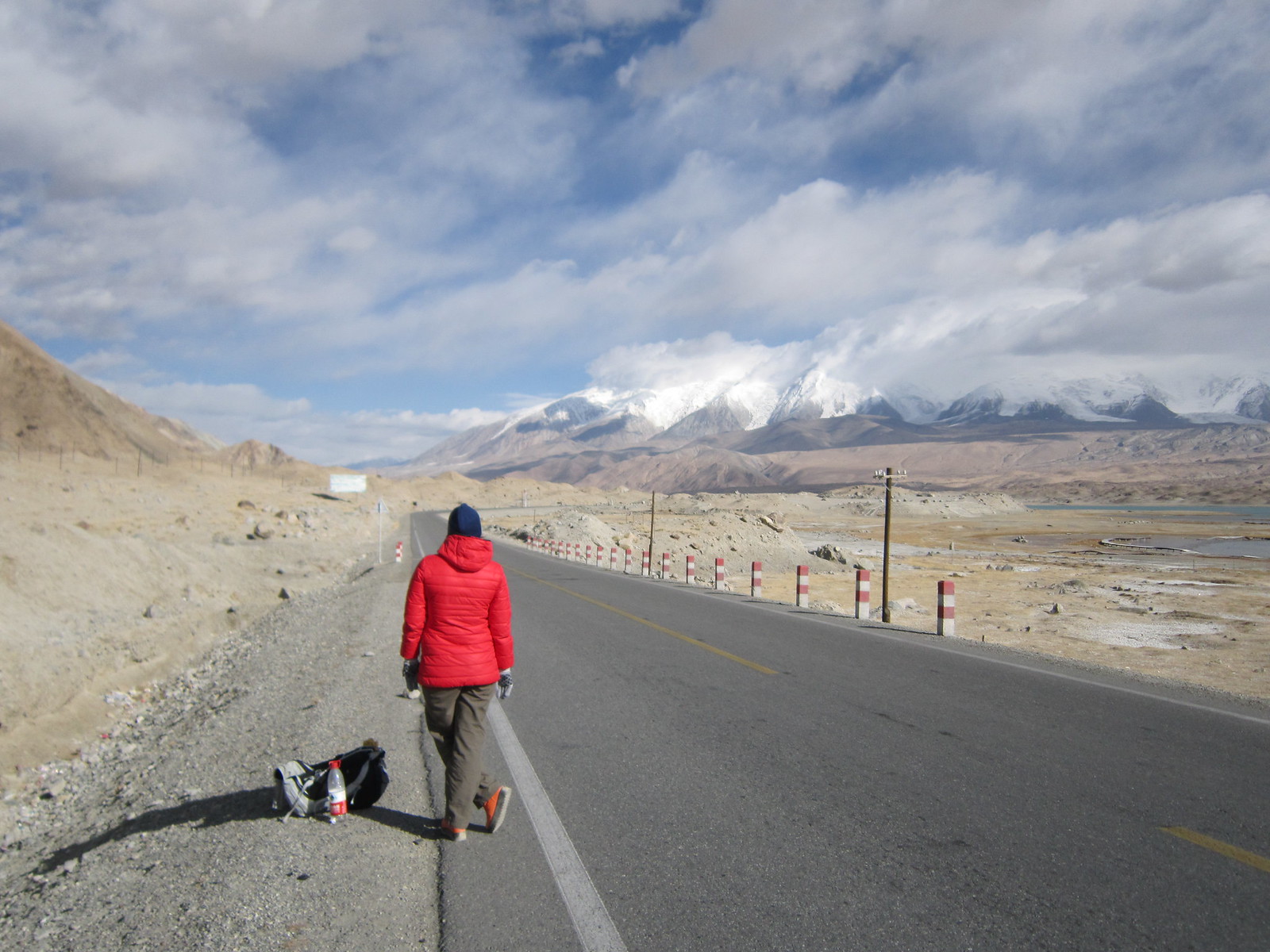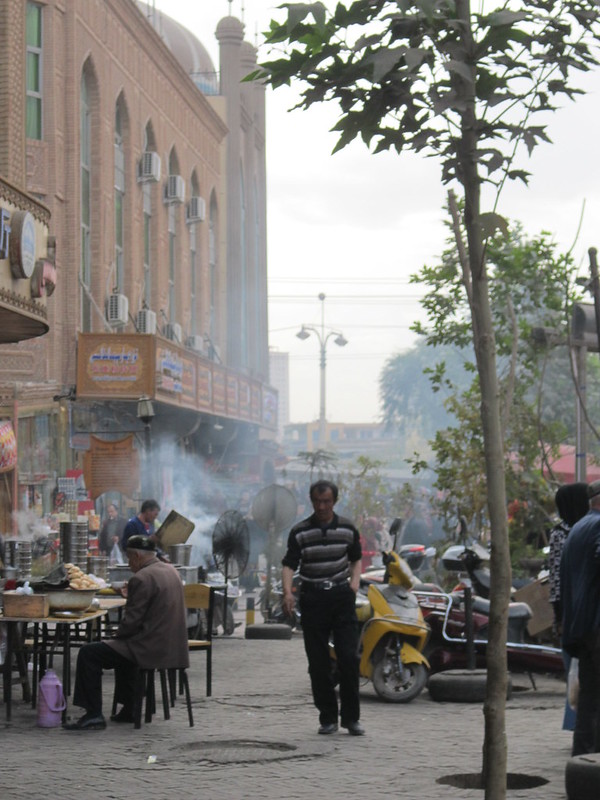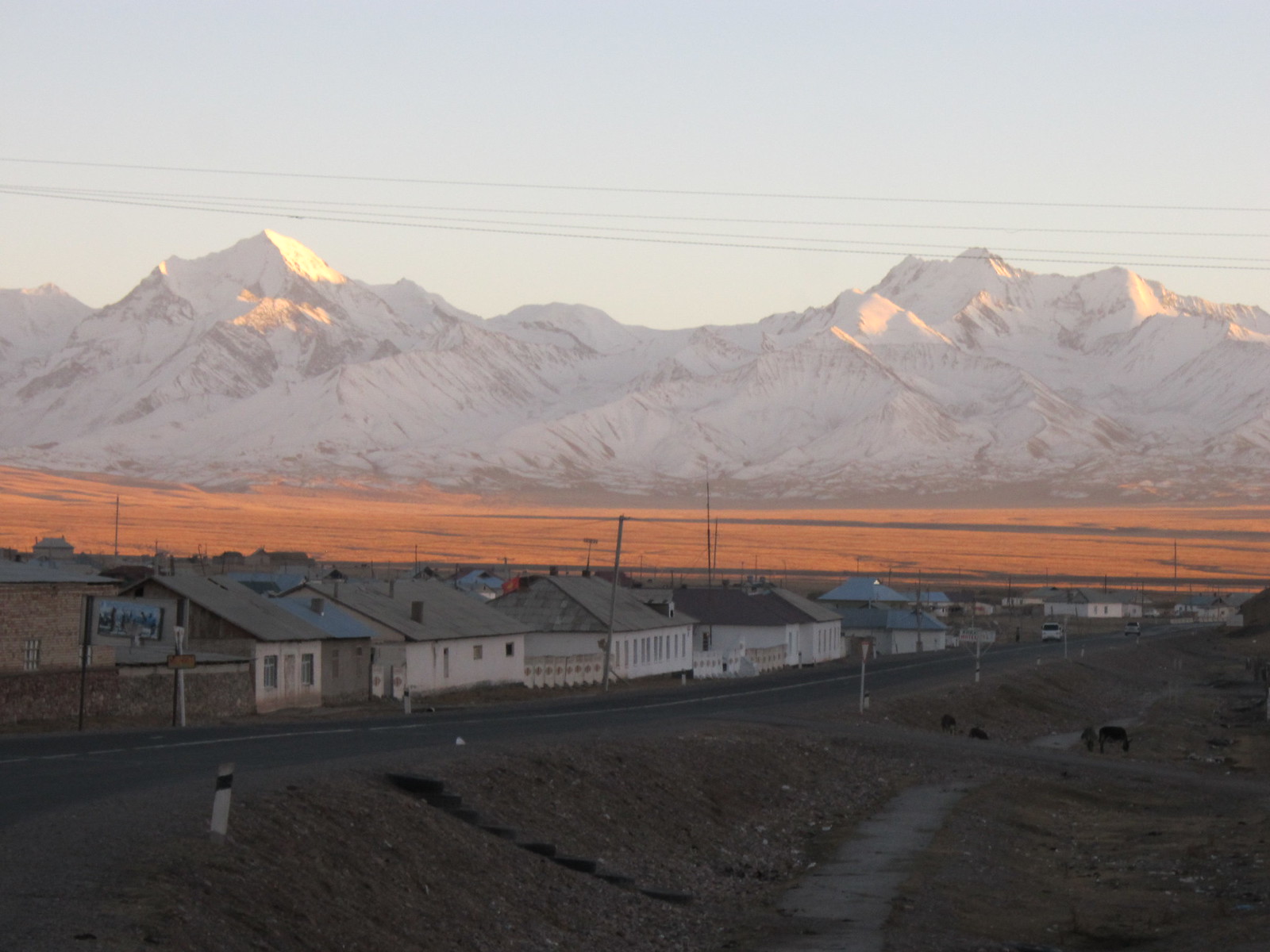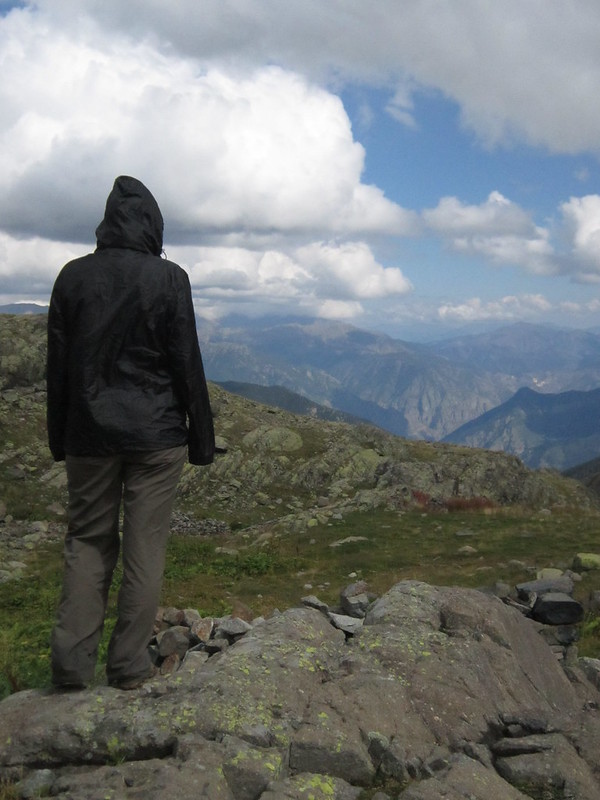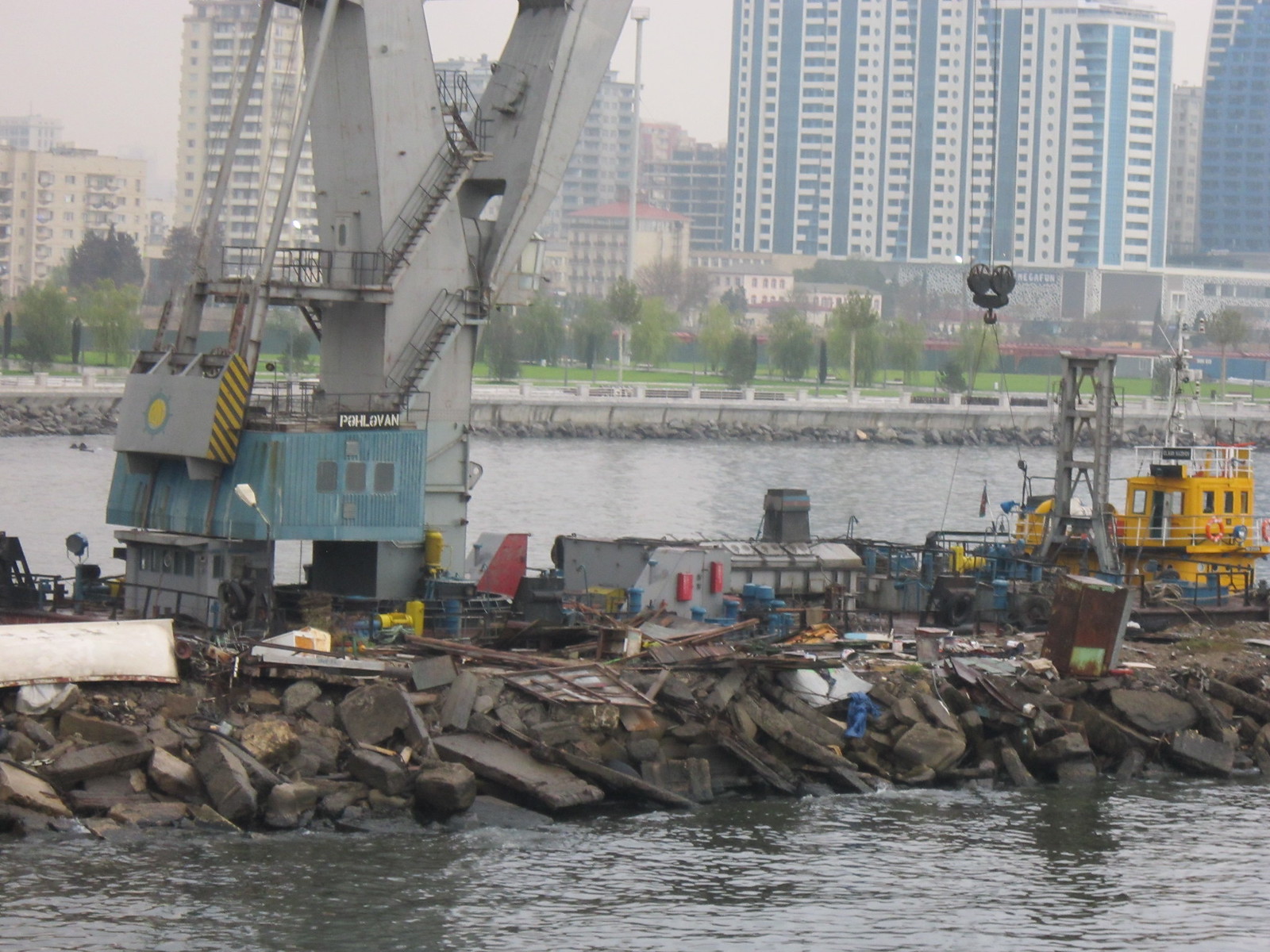
We shuffled across the dockyard, bent double into the wind and squinting through the dust cloud blasting our faces. The only things that seemed to be stopping us being blown out into the Caspian Sea were the bags of shopping and flaggan of water that we’d brought along for the voyage. Although the crossing from Azerbaijan to Kazakhstan usually takes about 24 hours, cargo ships sometimes have to wait off the Kazakh coast for up to 3 days before docking. There is no guarantee that the galley will serve food to passengers during this time.
We’d been dropped at the docks by the owner of our hostel who’d confidentally told us we could sail to Aktau in Kazakhstan from here. On zigzagging the yard asking several people where the ticket office was, a disturbing consistency was emerging. People were gesticulating back towards the centre of Baku where we’d just driven from. Worse still, we had 20 minutes until the elusive office was due to close.
Eventually an expressionless customers officer took pity on us and phoned a taxi. For a few minutes everything seemed to be working as intended: We reached the ticket office in time, bought tickets and were told to walk down to the quay and look for a ship called Professor Gul. Someone in a hat took a cursory glance at our passports and visas and we spotted the good ship moored up not far away.
There seemed no obvious place to go for further passport formalities but we were soon acosted by a gaggle of dock workers led by an aggressive looking guy in his 60s who barked at us in what turned out to be Russian.
Dressed in oily half-mast tracksuit bottoms with his shirt tied in a knot at his waist like a 90s school-girl, he demanded that we follow him into the bowels of a nearby ship mounted with a huge crane. Trying to suppress imaginings of Tarantino-esque horrors that may occur below deck, we followed, wondering if this was official procedure or just an intimidating tea break.
We were seated around a table in a filthy, windowless galley and I was told to make coffee in a rusty kettle whilst Claire was shouted at in Russian. We were eventually partially comforted when the Russian (by now known as Vladimir) phoned his English speaking daughter who explained to Claire that her father was a “good man” who had been in the Russian army and a boxer in his youth.
With little else to do until Professor Gul was due to leave 4 hours later, we sat and drank coffee whilst Vladimir downed shots of vodka with increasing rapdity and exhibited us to other dock workers who occassionally flitted in and out of the ship. The wind was still picking up outside and it howled across the skylights in the galley.
When Vladimir grabbed Claire’s hands and started licking her palms, then put one of his younger colleagues in a headlock whilst brandishing a kitchen knife, we decided it was time to leave. We bid fairwell and climbed on to the deck. On crossing the rickety gang plank back to the quay, we were relieved to find we hadn’t been followed.
We had been told that the ship would only leave when it was full of cargo (there is no timetable), but as we proceeded towards Professor Gul it became apparent she was moored about 50 yards off the quay and was only accessible via a narrow gang plank from another ship. It was now dark and there were no signs of life. We had been told the ship was expected to leave in an hour. That looked unlikely.
With no one around to ask who didn’t terrify us, we proceeded up the gang plank of the ship neighbouring the good professor and knocked on the rickety door of an office. Two guys popped out. One held a half empty bottle of vodka and neither spoke a word of English. However, their eyes looked slightly more sane and sober than some we’d met, so we tried to explain we wanted to board the ship to Aktau.
“Nyet!” They crossed their arms to simulate a no entry sign and one of them launched into a elaborate mime which we took to be an interpretation of the boarding procedure. After some scribbling of numbers on scraps of paper we had ascertained that there would be an event at 1am, another at 2.50am and a final Thing would occur at 5 or perhaps 6am. It wasn’t clear what, if any, action was required on our part.
By this time our friend Vladimir had arrived on board. He did not seem in a very friendly or sober mood and immediately launched into a heated argument with our new guides which resulted in the door of the office being shut in his face as he tried to put his fist through it. Immediately realising the importance of being on the correct side of the rickety door, we made a fairly passionate appeal to the saner eyed fellows to let us in with them. This they did, and we cowered in one corner of the office whilst another of the blokes sat with his chair against the door and blows rained down on it from outside. “Bad and crazy Russian man” we were told. We were inclined to agree.
Disinclined to attempt an escape through the now gale force winds that lashed the ship and run the risk of meeting Happy Vlad again in the dark, we decided to see how long we’d be welcome in the office. Perhaps if we waited long enough we’d learn what the first Thing would be at 1am.
The sane eyed fellows eventually dropped their guard on the door which resulted in a revisit from Vlad. In scenes reminiscent of “Here’s Jonny” in The Shining, he burst through the door without warning and advanced over to where I was sitting, rolling up his sleaves and clenching his fists. When his face was inches from mine he burst into peals of manic laughter. He then turned to Claire and proceeded to try and chat her up in Russian whilst she looked the other way. The sane-eyed blokes largely ignored all this and were now looking bored. Perhaps Vlad did this every night.
Vlad eventually disappeared for good and we were left in the office with one Azeri guy who had stayed pretty calm thoughout the whole debacle. He pulled two chairs together in a very uncomfortable sleeping arrangement for himself and refused to move when Claire and I tried to get him to sleep on the sofa were were sitting on.
We dozed off occassionally as we waited for the scheduled Things to happen. I occassionally braved the gale and possible appearance of Vlad to check that Professor Gul had not sailed without us. She hadn’t. By 6am she still hadn’t. None of the Things seemed to have happened either.
Dawn broke and the ferry looked as still and empty as it had 8 hours previously when it had first been scheduled to leave. We decided to call it a night, go back to our hostel and ask the landlady to phone the ticket office to see if there was a revised departure time.
Waking up groggy in our hostel bunks at 10am we were immediately told to pack and go – the ferry would sail at midday. “You look tired” the landlady told Claire.
Panicking, we gathered our things and got another taxi to rush us to the port. This time we made sure to avoid the boat with the crane on it and we managed to get through what seemed to be an official customs procedure. Professor Gul had moved and now had a railway track running into her cargo hold where a load of trains and containers were visible. We got exit stamps in our passports and boarded, paying about 10 quid extra for a clean-ish cabin with a shower, sink and toilet (no toilet seat) and a view of Baku harbour.
Baku harbour was to be the view for the next 11 and a half hours, at which point we fell asleep. Repeated enquiries about our departure time had been answered with a fairly consistent “One, two hours”. We hadn’t moved an inch out of Azerbaijan, but with single entry visas there was no way back – we’d just have to ration our food and wait.
